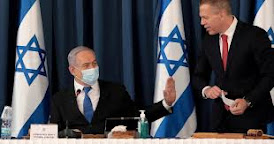Israel will not rely on efforts to return to a nuclear deal
with Iran, Prime Minister Benjamin Netanyahu said Tuesday. “Israel
isn’t pinning its hopes on an agreement with an extremist regime like (Iran),”
he said at a memorial service for the 1920 Battle of Tel Hai.
“With or without an
agreement, we will do everything so Iran isn’t armed with nuclear weapons,” he
added.
Referring to the story of Purim, which begins on Thursday
night, Netanyahu said, “2,500 years ago, a Persian oppressor tried to destroy
the Jewish people, and just as he failed then, you will fail today… We didn’t
make a journey of thousands of years to return to the Land of Israel to allow
the delusional ayatollahs’ regime to finish the story of the rebirth of the
Jewish People.”
On Monday, Netanyahu met with Defense Minister Benny Gantz,
Foreign Minister Gabi Ashkenazi, IDF Chief of Staff Lt.-Gen. Aviv Kochavi,
Mossad Director Yossi Cohen, National Security Adviser Meir Ben-Shabbat,
Ambassador to the US Gilad Erdan and others to discuss Israel’s strategy and
response to the Biden administration’s attempted rapprochement with Iran.
The United States is seeking to start a dialogue with Iran
and move toward a return to the 2015 Iran deal, US Secretary of State Antony
Blinken recently said in a statement with the European countries that were
party to the deal. Officials in Washington have called on Iran to return to
compliance with the deal before the US would remove sanctions.
Officials in the meeting were split on whether Israel should
advocate for the US to stay out of the Iran deal until it can get a better,
more-secure agreement, or be more supportive of what US President Joe Biden’s
stated plan is, to rejoin the Joint Comprehensive Plan of Action, as the 2015
Iran deal is officially called, and then negotiate tougher terms.
Netanyahu reportedly took the first, harder line, while
Gantz and Ashkenazi supported a less-confrontational approach.
As indicated by Netanyahu’s remarks, open opposition to a
return to the JCPOA is still on the table.
Rejoining “the old nuclear deal of 2015 that paves Iran’s
path to an arsenal of nuclear bombs will be a mistake,” Erdan told KAN Reshet
Bet on Tuesday.
If the US returns to the JCPOA by lifting sanctions, it
won’t have any leverage to convince Iran to reopen negotiations for a stricter
deal, he said.
Nevertheless, “a diplomatic solution is always preferable to
a military solution,” Erdan said, adding that “the question is whether there
will be an agreement that blocks any way Iran can get a nuclear weapon.”
The officials at Monday’s meeting agreed Israel should
continue its ongoing dialogue with the Biden administration rather than opt for
open confrontation, as it did in former US president Barack Obama’s second
term.
Erdan emphasized the importance of dialogue during his
interview with KAN Reshet Bet.
“The new US administration has shown a very honest and deep
will to hold organized consultations with Israel, led by US National Security
Advisor Jake Sullivan,” he said. “Israel is in a process of full dialogue with
the Biden administration and they are listening to our stance – the American
government and also central countries in Europe.”
Also Tuesday, the European parties to the JCPOA, known as
the E3, said Iran’s decision to block snap inspections by the International
Atomic Energy Agency was dangerous and a violation of the Iran deal.
The foreign ministers of France, Germany and the UK said
they “deeply regret” that Iran suspended what is known as the Additional
Protocol of the JCPOA.
“Iran’s actions are a further violation of its commitments
under the JCPOA and significantly reduces safeguards oversight by the IAEA,”
they said. “The E3 are united in underlining the dangerous nature of this
decision.”
The foreign ministers said stopping snap inspections would
limit IAEA access to nuclear sites and its ability to monitor Iran’s nuclear
program and related activities.
“We urge Iran to stop and reverse all measures that reduce
transparency and to ensure full and timely cooperation with the IAEA,” they
said.
The foreign ministers said they seek to preserve the JCPOA
and negotiate for Iran and the US to return to it.
The JCPOA’s additional protocol said the IAEA could hold
short-term inspections in locations that Iran had not declared as nuclear
sites.
Iran announced it would stop the inspections on Tuesday,
going back on a prior agreement to extend them for three more months. The move
was a response to the US not lifting sanctions on the regime.
Israel views the E3 as more open to the Israeli position
than in the past due to Iran’s repeated violations of the deal’s limitations,
KAN reported.
In recent weeks, Iran announced it would enrich uranium up
to 20% and produce uranium metal, which the E3 said has no credible civilian
use.
Israel has increased pressure on the E3 to try to talk them
out of rejoining the old Iran deal, with many more discussions about Iran than
usual, KAN reported.






















